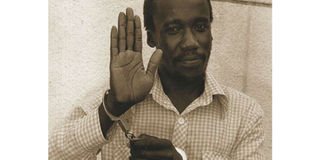Lingering questions on coup attempt

The leader of the August 1, 1982 failed coup, Senior Private Hezekiah Ochuka.
What you need to know:
- Some rebellious Kenya Air Force soldiers tried and failed to overthrow President Daniel arap Moi’s government.
- The group of Kenya Air Force soldiers had taken over the then Voice of Kenya radio station and announced that they had overthrown the government.
- They even attempted at gunpoint to force some of their fighter pilot colleagues to bomb the State House, Nairobi.
August is here again, with the polling day for the August 8 General Election being the key highlight.
This is also a month of major remembrances in Kenya. Of great historical significance is the commemoration of the 35th anniversary of the August 1, 1982 coup attempt.
This was when some rebellious Kenya Air Force soldiers tried and failed to overthrow President Daniel arap Moi’s government.
The leader of the failed coup, Senior Private Hezekiah Ochuka, and his co-conspirators, would later be court marshalled and eventually hanged.
Also implicated in that coup attempt were Jaramogi Oginga Odinga, the first Vice-President of Kenya, and his son, Raila Amolo Odinga, who is today Nasa’s presidential candidate.
HOUSE ARREST
The former was placed under house arrest, while the latter was sent to detention after initially being charged with treason.
Indeed, Raila Odinga and a number of other people were detained without trial at various times during the long reigns of both the founding President, Mzee Jomo Kenyatta, and his successor, Daniel Toroitich arap Moi.
They include a former university lecturer, Dr Willy Mutunga, former fiery MPs Martin Shikuku, Jean-Marie Seroney and George Moseti Anyona, top writer and scholar Ngugi wa Thiong’o, and one of the longest serving detainees, Wasonga Sijeyo, who was a close confidant of Jaramogi Odinga.
During the coup period, it will be recalled, many of us, who were then lanky excitable youths, would be paraded around the deserted streets of Nairobi, waving our national identity cards above our heads.
We would be frog-marched and forced to kneel on the tarmac at gunpoint.
Any wrong move and one would be shot without any hesitation. The experience was terrifying.
LOWEST MOMENTS
The aftermath of August 1, 1982 remains one of the darkest and lowest moments in the history of Kenya.
For several weeks, the entire country shook with fear and anxiety.
The group of Kenya Air Force soldiers had taken over the then Voice of Kenya radio station and announced that they had overthrown the government.
They even attempted at gunpoint to force some of their fighter pilot colleagues to bomb the State House, Nairobi.
However, once airborne, the pilots dropped the bombs over the Mount Kenya forests.
The putsch was quickly suppressed by the loyal forces commanded by Major-General Mohamoud Mohamed (later the Chief of General Staff).
OVERTHROW GOVERNMENT
I always wonder what could have prompted anyone to want to overthrow the government in 1982. Mr Moi was then only four years in power.
He had set free all the political prisoners from Mzee Kenyatta’s reign.
He was orchestrating his populist Nyayo “philosophy of peace, love and unity, to popularise his government”.
He was busy trying to unite and heal a country that had been torn apart by tribalism.
Why anyone would have wanted to overthrow him at that time beats the logic.
The coup leaders and planners must have been driven only by greed and a raw desire for power.
HUMAN RIGHTS
To date, opposition leader Odinga has stamped onto his persona the image of a person who fights tirelessly for the human rights of fellow Kenyans.
He was firmly in the brigade of those who fought for what has been dubbed Kenya’s second liberation.
What the younger generation who form the bulk of his unquestioning followers might not know is that their leader’s youthful improprieties included treason – a serious offence then and today.
The intervening years have not whitewashed this label.
Whereas Raila was lucky to escape death on a legal technicality, those alleged to have been his accomplices in the Kenya Air Force paid with their lives, as did hundreds of other soldiers and civilians caught up in the bloody aftermath of that coup attempt.
PROMULGATION
Prior to the promulgation of the new Constitution in 2010, the previous Criminal Procedure Code was explicit in case of treason. Death was mandatory.
Unable to secure a conviction, then Attorney-General Joseph Kamere withdrew the treason case against Raila and an attempt to bring a Bill to Parliament to amend the law was dropped following a public outcry.
Raila Odinga has been a part of Kenya’s turbulent history.
Can the man heal the country's wounds? Can he be trusted with power?
Mr Wambilianga is a political commentator. [email protected]





